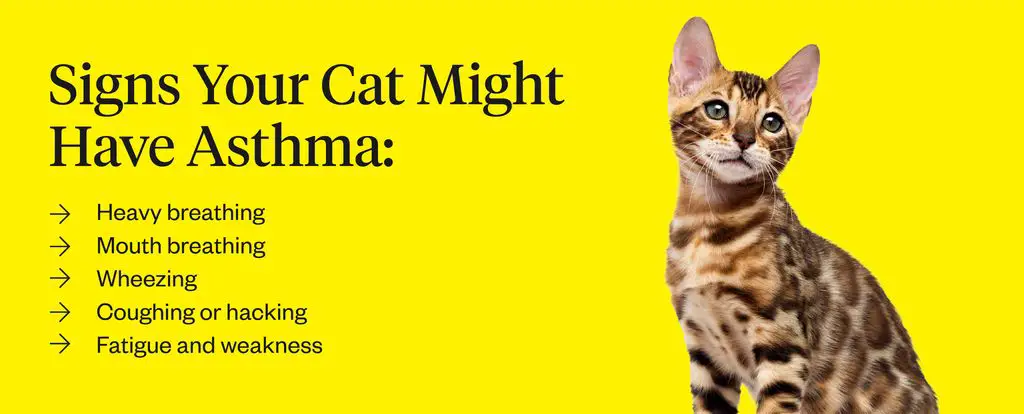Does your cat have asthma? This guide helps you manage it. Learn what to do during an asthma attack. You can keep your cat safe and happy.
Recognizing Symptoms of Cat Asthma
First, know the signs of an asthma attack. Here are some common symptoms:
- Wheezing or coughing
- Open-mouth breathing
- Labored or rapid breathing
- Blue or pale gums
- Hunched posture
If you see these signs, your cat may be having an asthma attack. Act quickly to help your pet.
Immediate Actions to Take
If your cat is having an asthma attack, follow these steps:
1. Stay Calm
Your calmness helps your cat stay calm. Panic can make the situation worse.
2. Move Your Cat To A Quiet Area
Take your cat to a quiet, stress-free room. This helps reduce anxiety and makes breathing easier.
3. Administer Medication
If your vet has prescribed an inhaler, use it now. Follow the instructions carefully.
4. Provide Fresh Air
Open a window or use a fan. Fresh air can help your cat breathe better.
5. Contact Your Vet
Call your veterinarian right away. They can give you further instructions.
Long-Term Management of Cat Asthma
Managing your cat’s asthma involves a long-term plan. Here are some tips:
1. Regular Vet Visits
Take your cat to the vet regularly. This helps monitor the condition and adjust treatment as needed.
2. Medication Management
Make sure your cat takes its medication. Follow your vet’s instructions carefully.
3. Reduce Allergens
Keep your home clean and free of dust. Use air purifiers if needed.
4. Avoid Smoke
Keep your home smoke-free. Smoke can trigger asthma attacks.
5. Watch For Triggers
Identify what triggers your cat’s asthma. Avoid these triggers as much as possible.

Credit: www.vet.cornell.edu
Diet and Lifestyle Changes
Diet and lifestyle changes can also help manage asthma. Here are some suggestions:
1. Healthy Diet
Feed your cat a balanced diet. This helps keep your cat’s immune system strong.
2. Weight Management
Keep your cat at a healthy weight. Obesity can make asthma worse.
3. Exercise
Encourage your cat to exercise. This helps keep the lungs strong.

Credit: www.tuftscatnip.com
Emergency Preparedness
Be prepared for emergencies. Here are some tips:
1. Emergency Kit
Have an emergency kit ready. Include your cat’s medication, vet contact information, and a carrier.
2. Know Emergency Numbers
Keep your vet’s emergency number handy. Know the location of the nearest emergency vet clinic.
Frequently Asked Questions
What Are Signs Of Cat Asthma Attack?
Wheezing, coughing, difficulty breathing, and rapid breathing are common signs.
How Can I Calm My Cat?
Keep your cat calm and stress-free. Create a quiet environment.
Is Cat Asthma Treatable?
Yes, with proper medical care and medication, cat asthma can be managed.
Can Allergies Trigger Cat Asthma?
Yes, allergens like pollen, dust, and smoke can trigger asthma attacks in cats.
Conclusion
Asthma in cats can be managed with care and attention. Recognize the symptoms and act quickly during an attack. Follow long-term management tips to keep your cat healthy. With the right care, your cat can live a happy, healthy life.
Frequently Asked Questions (FAQs)
Here are some common questions about cat asthma:
| Question | Answer |
|---|---|
| What causes cat asthma? | Allergens like pollen, dust, and smoke can cause asthma. |
| Can cat asthma be cured? | No, but it can be managed with medication and care. |
| Is cat asthma common? | Yes, many cats suffer from asthma. |
| What should I do if my cat has an asthma attack? | Stay calm, move your cat to a quiet area, and contact your vet. |
If you have more questions, talk to your vet. They can give you the best advice for your cat.

Hello, this is Frank Swanson, the owner, and operator of Pet Info Hut. I created this website as a way to share my love of pets with the world. I have over 7 years of experience working with animals, and I have a passion for helping people care for their pets. I hope that you find my website useful and informative. Thanks for visiting!
